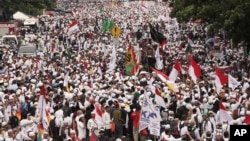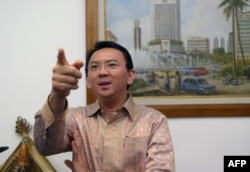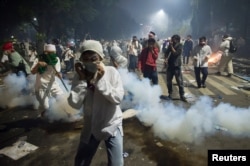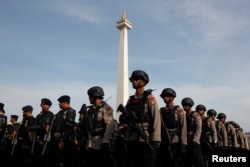It's a trope of Indonesian news to refer to protesters as the nasi bungkus, or boxed lunch crowd, a reference to the fact that many rallies rely on paid supporters, with catered meals, for better optics. This actually wasn’t the case at the recent huge rally against Jakarta's ethnic Christian-Chinese governor. For that, most seemed to have attended voluntarily.
But a closer look at the boxed lunches – and water, trash cans, snacks, and volunteers – that padded that event reveals a diverse and unusual network of logistical support.
Their funding sources include Muslim charity groups, individuals like the singer Ahmad Dhani and the writer Ratna Sarumpaet, and anonymous donors. Their collective backing points to the variety of discontent with Jakarta’s governor, Basuki Tjahaja Purnama, widely known as Ahok.
Although the rally’s pretext was very narrow – a single remark from last month that was considered blasphemous – protesters also represented neighborhoods facing eviction by Ahok and conservative groups without a foothold in President Joko Widodo’s secular administration.
It is important to understand the diversity of anti-Ahok sentiment because it means this movement will not expire quickly.
Sky management
The day after the protest, volunteers from the Muslim charity AQL Laznas were distributing leftovers outside Masjid Istiqlal, where the protest had started. While handing out packets of noodles, water bottles, and dried dates, one volunteer told VOA the provisions were paid for by the Islamic Defender’s Front, or FPI, the hard-line Muslim group that organized the rally; the rock musician and Ahok critic Ahmad Dhani; and the playwright and activist Ratna Sarumpaet.
When asked to confirm whether the FPI had materially supported the protest, Munarman, a spokesperson for the group, denied it. “It was Allah who prepared for us, nobody can prepare it. We call it ‘sky management,’” he said.
Other Muslim charities were happy to take credit. Both AQL Laznas and Baitul Maal confirmed that they supplied food and hundreds of volunteers to support protesters on November 4.
Both groups are general interest charities based in Jakarta whose activities include things like disaster relief, orphan care, and farmer empowerment. And both said this is the first political protest they had ever supported logistically.
An AQL Laznas spokesperson said it provided “rice, bread, drinking water, portable toilets… and about 200 volunteers along the path of action, ranging from Masjid Istiqlal to Jl. Medan Merdeka Barat.”
Baitul Maal received over 500 nasi padang packet donations at its office a day before the protest, and they had no idea who paid for them or sent them, said Syahrul Hadi, a spokesperson for the organization. AQL Laznas also said “someone” sent provisions to its office before the protest, and declined to elaborate.
Hadi suspects their organizations were the beneficiaries of a large wave of donations to the Majelis Ulama Indonesia (MUI), the group that issued the fatwa to jail Ahok last month.
After FPI announced plans for a rally to support the fatwa, MUI received “three billion rupiah in donations in its bank account in less than 24 hours.” MUI could not be immediately reached for comment. “The donors’ data didn't spread to us,” Hadi told VOA.
“There were many organizations like ours that volunteered on 4/11,” said Hadi. “The main [organizing] committee for all our groups was MUI, but we also had partners outside their umbrella, like Daarut Tauhid, which helped us clean up garbage.” In fact, there were so many donations that day, said Hadi, that most protesters declined their help – hence the copious leftovers at Masjid Istiqlal.
Obscure sources
Muslim charities did not have a monopoly on logistical support and anti-Christian sentiment was not the only factor underlying the huge rally.
The likely patronage of Ahmad Dhani and Ratna Sarumpaet, neither of whom directly confirmed their involvement to VOA, indicates support beyond the FPI’s hard-line religious interests. Dhani, who attended the protest with his wife, mentioned Ahok’s “land reclamation cases” as another offense. Sarumpaet has long been a vocal opponent of Ahok’s evictions in Pasar Ikan, a Jakarta neighborhood that the governor wants to raze for redevelopment.
“There were really different sets of money at play at this event,” said Ian Wilson, a Murdoch University researcher who focuses on Indonesian politics. “Although it’s easy for folks like Ahmad Dani and Sarumpaet to play up racist undercurrents, there is genuine anger from lots of different places.
“I think the allegations that people were just paid to show up are misleading,” he continued. “Usually this logic is used to discredit the fact that people are mobilizing”
Genuine populism
The level of planning and organization that went into the 4 November rally is notable, according to many observers. Although many Jakarta protests rely on hired “protest organizers,” there was little evidence of hired manpower at the rally.
Indra Budiari, a Jakarta Post reporter who visited FPI headquarters the night before the rally, said that hundreds of protesters were already camped out there, having traveled from long distances. He called it “very unusual.”
“Typically, protesters are local people or people who come from nearby cities, but last week people were coming from everywhere,” he told VOA.
“The number of voluntary participants in this rally is one of many things that made it different from previous protests,” said Abdil Mughis, a University of Melbourne PhD student based in Jakarta. “Although I think we can still assume that there were some groups who may have been hired by elites,” he said, considering how many different actors were represented that day.
Different rally
What’s interesting about how the November 4 rally transpired is that it’s almost a reversal from how Jakarta protest usually unfold.
Typically, food and refreshments are the incentives for hired protesters. In this case, the protesters came largely of their own accord; they didn’t expect all the extras. But it was there for them anyway, in much larger quantities than could even be utilized. And it was one reason why, for most of the hot, rain-free day, 200,000 protesters were happy, peaceful, and organized.
“Look, protests go on for hours, people need to eat and drink,” said Wilson. “This free food and so forth isn’t a reason to go. It just makes it easier for poor people to participate in actions like this.”
A broad base for discontent
In many important ways, the November 4 rally was an atypical production. Under a slim pretext, it convened land rights activists, religious conservatives, political partisans, celebrities, and ordinary citizens from as far away as Bali. It was not spontaneous.
These groups made a de facto coalition, suggested Mughis in an editorial, because the present administration broadly does not accommodate Muslim conservatism. Their diversity is reflected in their broad base of material support, one which is likely to continue in future planned protests.
Finally, there are rumblings that the support base is about to get even broader: Nahdlatl Ulama, the country’s biggest moderate Muslim organization, released a “jihad fatwa” last week that some are interpreting as tentative support for future anti-Ahok activism.
“If there is another protest this month, I think the two biggest Islamic organizations, NU and Muhammadiyah, will join us,” said Hadi, of Baitul Maal. “I'm very impressed how our God unites us. It’s a matter of faith, you know?”












